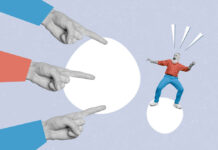A new study published in the Journal of Health and Social Behavior addresses the long debate on the consequences of self-labeling – the process of adopting psychiatric language such as “mental illness” to describe one’s own distress.
There have been many debates amongst the public, researchers, and mental health providers about whether adopting a mental illness label is empowering and helpful for mental health recovery or actually harmful to psychological well-being.
Sociologists Lexi Harari, Sharon S. Oselin, and Bruce G. Link draw on several sociological theories to investigate the impact of self-labeling on youth experiencing mental health problems. Drawing from longitudinal data involving middle school students in Texas, their study suggests that identifying with a mental illness label is harmful to youth self-esteem.
“While a medicalized ‘insight’ perspective emphasizes the importance of self-labeling for psychological well-being and recovery, a sociologically informed ‘outsight’ perspective draws from modified labeling, self-labeling, and stigma resistance theories to suggest that self-labeling can generate negative consequences for self-esteem,” the authors write.
 According to the medical model, understanding oneself in psychiatric terms is essential because it provides “insight” into one’s illness or allows one to make sense of their distress by accepting a mental illness diagnosis. This acceptance is believed to promote help-seeking and contribute to successful treatment outcomes. Based on the “insight” perspective, self-labeling with a mental illness should improve self-esteem.
According to the medical model, understanding oneself in psychiatric terms is essential because it provides “insight” into one’s illness or allows one to make sense of their distress by accepting a mental illness diagnosis. This acceptance is believed to promote help-seeking and contribute to successful treatment outcomes. Based on the “insight” perspective, self-labeling with a mental illness should improve self-esteem.
However, this perspective is critiqued because when someone chooses to reject a self-label, they are often seen as not fully understanding their illness or are accused of refusing treatment. Sometimes, refusing to self-label is even considered a symptom of mental illness that prompts additional medical treatment.
In contrast, the sociological “outsight” perspective critically considers the negative social consequences associated with self-labeling. For instance, this perspective uses modified labeling theory to consider the judgment and negative treatment people often experience after being labeled with a mental illness in a clinical setting.
It also draws on self-labeling theory to examine the adverse consequences labels have on psychological well-being.
Lastly, it applies stigma resistance theory to suggest that people often choose to reject self-labels to avoid negative stereotypes commonly associated with mental illness. According to this perspective, it is expected that labeling oneself with a mental health diagnosis will harm self-esteem.
Drawing on these conflicting perspectives, the researchers created a test to investigate whether self-labeling leads to better or worse self-esteem for youth ages 11-14. To do so, a school intervention was done in Texas to educate students about mental health and reduce negative beliefs about people who experience mental illness.
During this time, data was collected to see if the youth self-label or agreed with the statement: “I have a mental illness.” Over two years, the researchers followed up with students about their personal experiences with self-labeling to track whether youth (1) adopted a self-label, (2) consistently maintained a self-label, (3) dropped a self-label, or (4) never self-labeled. Using this information, they tested whether having a self-label improved or harmed self-esteem over time.
Findings support the sociological “outsight” perspective because self-labeling was shown to be harmful to youth self-esteem. More specifically, the authors emphasize the following:
“It is the adoption of a self-label that is particularly detrimental to self-esteem in both the short- and long-term.”
Their findings reveal that youth who stopped self-labeling had improvements in their self-esteem which shows “additional support for the outsight perspective, signaling that self-labels are generally harmful to youth self-esteem, and by extension, shedding them can yield positive effects.” The researchers found no differences in self-esteem outcomes based on participant race, ethnicity, or socioeconomic status.
Since this study took place in one Texas school district and focused explicitly on a middle school age group (ages 11-14), these findings do not represent youth experiences nationwide.
Despite the limitations of this study, these findings are of utmost importance because of the exponential increase in mental health screening and the overdiagnosis of mental health conditions in children and youth. Awareness of the harms of self-labeling is also crucial because providers in treatment settings often assume that self-labels facilitate the mental health treatment process and improve psychological well-being.
However, psychiatric survivors who have personally navigated the mental healthcare system share that mental illness labels led to feelings of hopelessness and trapped them in a system that overmedicated their suffering.
Practitioners and the mental healthcare system must consider the complex ways that the recognition, adoption, and acceptance of mental illness diagnoses can harm psychological well-being and self-esteem, especially for youth in a critical stage of identity development.
****
Harari, L., Oselin, S. S., & Link, B. G. (2023). The Power of Self-Labels: Examining Self-Esteem Consequences for Youth with Mental Health Problems. Journal of Health and Social Behavior, 002214652311759. https://doi.org/10.1177/00221465231175936 (Link)















Psychiatric labels harm adults, so imagine the damage these do to a young person’s emerging sense of self.
Report comment
Not surprising to me, but this is important research! The industry relies heavily on claims that “accepting you have an illness” and that “treatment” is just like “insulin for diabetes” reduces “stigma” and makes it easier for people to feel OK about their “mental illness.” Those in charge know these claims are not actually TRUE, but justify using them as PR because “people are more likely to seek help.”
Like other stigma-based research on labels, these findings fly right in the face of these claims. There is no excuse or justification for lying to your clients in the first place, but this kind of research takes away the justification and exposes their “theories” for exactly what they are – propaganda to get more people onto psychiatric drug regimes!
Report comment
Stoking fear is psychiatry’s bread and butter.
Report comment
I know a ten year old who hates being called diabetic and hates taking insulin for it.
This girl has a real physical problem that gone untreated would end in her death (at least that’s what the doctors say). But that doesn’t change the fact that having the label and having to take medicine has a detrimental psychological effect on her.
Mental health labels have the added problem of being totally clueless. While it is inevitable that a person who stands out from the crowd for some reason will end up being called something by some people, it is not clear that such social behavior is EVER helpful.
While I am taught to evaluate people on the Tone Scale, for instance, I am also trained to NOT tell people my opinion of where they are on that scale. That’s my own evaluation for purposes of regulating my interactions with them. What they decide to do with their life is a separate problem that is best decided by them, not me.
Report comment
Quite so. It is my experience that telling another person what to think/believe, even if you’re 100% correct, robs them of the ability to realize it for themselves, so they have to either agree or disagree with you instead of realizing their own path. I think exploring possibilities/brainstorming can be fine, but as soon as we start telling the other person what to think of their life and what to do about it, we start doing damage.
Even the girl with “diabetes” can be talked to about how best to frame it from her viewpoint. Perhaps she comes up with, “I have to eat a special diet/take a drug to help” or “My body has trouble handling sugar and I have to take special precautions” or even “Sugar and I have a love-hate relationship.” Why not help her come up with what she feels comfortable instead of deciding what to call it and taking her options away?
Interesting story – I used to work for a crisis line. A woman I had talked to many times called in and said angrily, “Those doctors told me I have Borderline Personality Disorder! I don’t have Borderline Personality Disorder! How DARE they say that about me!” I asked her, “What did they say that meant?” She says, “Well, they didn’t exactly explain it, but they said I have it and I don’t!”
I said, “Let me get out the DSM and read off what they say defines this ‘personality disorder.'” So I read them off to her. “Emotionally volatile?” “Well, yeah, definitely.” “Sometimes feigns suicide for attention?” “Yes, I do that.” “Difficulty with trust in intimate relationships?” “Oh, yeah, for sure.” After I read a few more, she very calmly said, “Well, I guess I DO have it!”
How different would this have gone if they simply started with saying, “It seems to me like you get pretty emotional about things compared to most people. Does that seem true to you?” Or better yet, “What kind of things do you tend to do that you wish you didn’t?” And just describe the behavior instead of the label. She clearly had no trouble acknowledging the behavior she engaged in, was quite aware of it, in fact. But the act of labeling pissed her off big time! So why bother with the label? Why not start with the client’s framing of the problem and go from there?
Report comment
Psychiatric terminology poisons young minds.
Report comment
Making a client’s identity depend on an arbitrary label, which translates more or less directly into a notion of belonging to some group, e.g. the set of people having the same diagnosis, is a well-known technic used by cults to recruit new members and keep them in.
Teens, for the most part, don’t diagnose themselves because they feel genuinely mentally ‘ill’. They do so because they’re looking for identities.
The fact that so many teens now make their identity depend on the notion of having a diagnosis is also very alarming for reasons other than medical malpractice. This is self-sustained pathologization perpetuated not only by corporations but by customers themselves. This is what happens when billion dollar industrial complexes have successfully applied cult theory. Knowing the cause, I also know that it is going to be exceedingly hard to backroll on that now.
Report comment
Exceedingly hard, yes. But not impossible, especially once people realize how and why they’re being manipulated.
Report comment
I like to think that self-awareness is good for a person. And that requires some sort of intellectual framework. But the current psychiatric system of “disorders” is so poorly thought out and useless that it could never serve as a step towards greater self-awareness. Would be wiser to just take up meditation or something, though that wouldn’t be my first choice.
Report comment
Words, diagnoses, verbiage and the like are meaningless drivel when those afflicted are treated as non human waste.
My son was afflicted with schizophrenia (no, not a schizophrenic) and D. I.D. (once multiple personality disorder.
Two years ago his case manager declared him “missing” in March of 2021. Two months later the Medical Examiner contacted me and told me my son was found severely decomposed on the floor of his apartment. The incompetent (is that the correct terminology?) case manager never performed a welfare check she only called the apartment manager and asked if anyone had seen my son.
My son was not benefited by the DSM-VI considering schizophrenia a “spectrum disease”.
He was not afforded more competent providers nor more compassion for the society as a whole.
No verbiage will miraculously return his cremated remains back into the complete person, son, brother, human being the system decided he lost the right to be.
Report comment